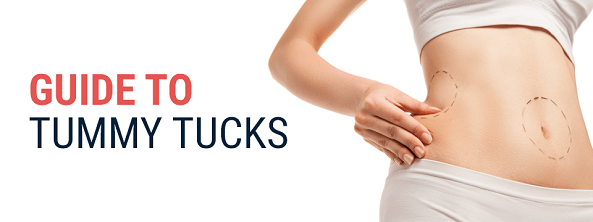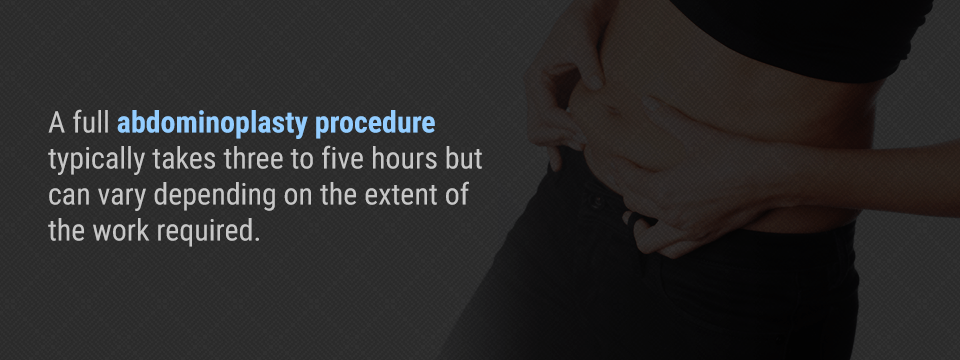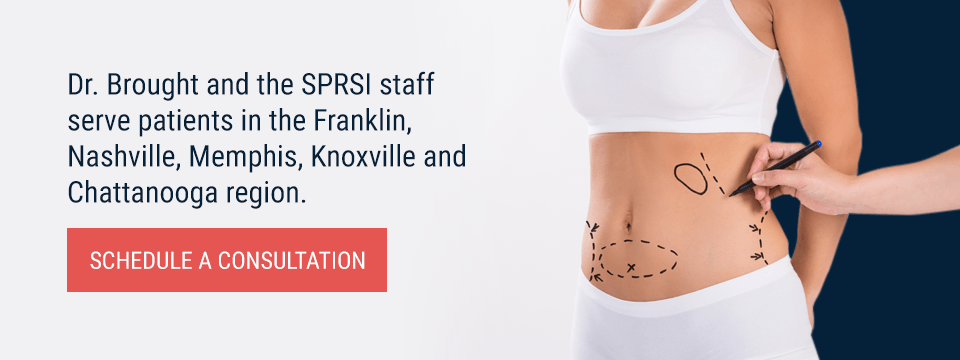Home // Body Procedures // Abdominoplasty/Tummy Tuck
Abdominoplasty (Tummy Tuck) Procedure in Franklin & Nashville TN

A toned and flat abdominal area is a goal that many people wish to attain but often find difficult to achieve. Factors such as weight gain and loss, pregnancy and childbirth can contribute to weakened and stretched abdominal muscles, loose and sagging skin, and stubborn fat deposits. Additionally, as we age, it becomes harder to keep the abdominal area tight and toned. Many adults, after trying dieting and exercise to no avail, often turn to abdominoplasty, commonly known as a tummy tuck, to achieve a firmer and flatter abdomen, with reliably-excellent results. In fact, tummy tucks rank among the top five most common plastic surgery procedures in the U.S. If you have tried to tighten your abdomen with diet and exercise and still haven't achieved your desired results, schedule a consultation with Dr. Nathan Brought to discuss your options.
What is a Tummy Tuck?

Abdominoplasty or tummy tuck is a surgical procedure that removes excess tissues, including fat and skin, while tightening sagging abdominal muscles. After the surgery and recovery, your abdomen will be noticeably flatter and firmer. You can expect the results of your tummy tuck to last for many years, although they can be significantly diminished by events such as pregnancy or significant weight gain or loss.
What Does Tummy Tuck Surgery Entail?
During your consultation with Dr. Brought, he will advise you which type of tummy tuck procedure will help you achieve your desired goals, with the most natural looking results and minimal scarring.
- Mini-tummy tuck surgery: Improves the lower abdomen and is a less extensive surgery since it usually involves a single incision and a smaller area.
- Full tummy tuck surgery: Improves both the upper and lower abdomen and is more extensive since it usually involves a larger area of dissection, additional skin removal, and tightening of the abdominal musculature from just below the sternum to the pubic area.
A full abdominoplasty procedure typically takes three to five hours but can vary depending on the extent of the work required. A partial abdominoplasty or mini-tummy tuck procedure usually takes less time. Both typically take place under general anesthesia for patient comfort.

To begin, Dr. Brought will make a long incision from one hipbone to another, just above the pubic area and under the panty line to hide the incision. He then frees the navel from the surrounding tissue. During a mini-tummy tuck procedure, Dr. Brought will make a significantly shorter incision than in a traditional tummy tuck, and may not need to move the navel.
Next, Dr. Brought will separate the skin from the abdominal wall from the incision up to the ribs, lifting the skin flap to reveal the muscles in your abdomen. These muscles are often separated due to pregnancy or weight fluctuations, resulting in a weakening of the abdominal wall called diastasis. Dr. Brought will tighten these muscles by stitching them back together, resulting in a firmer abdominal wall and a narrower waistline. During a mini-tummy tuck, the skin will be separated only up to the belly button.
Dr. Brought will then pull down the skin flap, remove the excess skin and form a new hole for your navel if necessary. He will stitch your incisions, apply dressings and may place drains to help prevent a buildup of fluid in the abdomen. Before you wake up, Dr, Brought will also apply an abdominal binder, which you will wear for several weeks after your surgery. This garment provides comfort and support in addition to minimizing the risk of fluid collection at the surgical site.
Dr. Brought prefers to use mostly absorbable sutures which reduce the number of stitches that need to be removed postoperatively. These stitches dissolve over time as you heal and your incisions strengthen.
Schedule Your Consultation TodayThings to Consider With Tummy Tucks
There are a few important things to consider before having a tummy tuck. To ensure that your procedure goes smoothly and that you achieve the desired results, you need to know all the potential risks and benefits and make arrangements beforehand. Some things to consider include:
- Recovery Time: Recovery may be a slow process, from weeks to months, which can be longer if you have any complications. It may take up to a year to heal completely.
- Getting Help: You will need someone immediately after your surgery to help you with daily activities, children and pets. You may not be able to drive for a few weeks.
- Taking Time Off from Work: Many patients return to work after two weeks while others require four or more weeks for recovery, depending on the type of work they are required to do.
- Being at Your Ideal Weight: It is recommended that you are within 10 to 15 pounds of your ideal weight before surgery. Gaining or losing an additional amount of weight can result in needing revision surgery.
- Having Sugrical Drains: Most abdominoplasty patients come home with surgical drains that require care. You can usually have them removed after 1 to several weeks following surgery.
- Having a Permanent Scar: Although it will be discreet and fade over time, abdominoplasty surgery results in a permanent scar across your lower abdomen.
Who Is a Good Candidate for a Tummy Tuck?
Although abdominoplasty can provide superior results, not everyone is a suitable candidate for the procedure. Ideal candidates for tummy tuck surgery should be in good overall health without any serious medical issues and mentally and physically prepared for the discomfort and recovery time of surgery. Nonsmokers are the best candidates since smoking can result in complications and delayed healing.

Patients should have realistic goals and expectations and want to make a realistic improvement to the appearance of their tummy. Abdominoplasty is appropriate for people who have lost weight and want to have their excess fat and skin removed. Patients who are still in the process of losing a lot of weight should wait to have surgery until they have lost the desired amount. It is also helpful for people who have tried diet and exercise without desired results, although it's important to note that surgery is not an alternative to maintaining a healthy diet and exercise regimen.
Women who want to fix the appearance of their tummy after pregnancy and childbirth also make good candidates. Women who are not done having children or are considering pregnancy in the near future should wait to have the surgery, as the muscles that are repaired during the tummy tuck can separate again during pregnancy. Schedule a consultation with Dr. Brought to determine if abdominoplasty is right for you.
When is the Best Time to Get a Tummy Tuck?
Many potential tummy tuck patients wonder when it's best to get abdominoplasty. While each patient is different, the best time to undergo tummy tuck surgery is:
- After losing a desired amount of weight
- After pregnancy and childbirth
- After trying a diet and exercise regimen for a reasonable amount of time
What to Expect With Tummy Tucks
Before your surgery, you should avoid certain medications such as aspirin along with certain vitamins and herbal supplements. You will also need to avoid alcohol and nicotine use for at least six weeks after your surgery to avoid complications and problems with healing.
On the day of your surgery, you will need someone to drive you to and from the surgical center or hospital. Although your surgery may be done on an outpatient basis, you may need to stay for a few hours after or even overnight if your surgeon recommends it. You will also need someone who can help you with daily activities for the first few days after your surgery.
After your surgery you will receive instructions on:
- Things to be aware of regarding infection and your health
- Incision and drain tube care
- Bathing and showering
- Follow up appointments with your plastic surgeon
- Expected time for wearing the abdominal pressure garment
- Recommended foods
- Recommended rest
- Activities to avoid
- Medications to avoid
- Prescriptions including antibiotics, topical and pain medications and anticoagulants
Common side effects following tummy tuck surgery include:
- Swelling which may last for up to several months after surgery
- Pain, which may require the use of pain medication, that gradually subsides after the first few days after surgery
- Bruising
- Numbness that can last for months or years
- Tightness upon standing
- Red, raised incision that may darken then fade over time. While your incision scar will not disappear completely, it should fade over time and become discreet and easy to hide under swimsuits and other clothing
- Fluid-filled swelling above the incision
Recovering From a Tummy Tuck
After undergoing abdominoplasty, it's essential that you take the time to rest and recover. Don't try to do too much too soon. It can take between several weeks and several months to fully recover from your surgery. Being in good physical condition and health before your operation increases the chances of a quicker recovery as does having a recovery space that is comfortable and relaxing.

The time it takes to recover from a tummy tuck is different for each patient and depends on several factors including:
- Your weight
- Your age
- Your overall health
- The type of tummy tuck you had
You will have drains that will be left in for several days up to several weeks following surgery. You will receive instructions on how to empty and care for them. During this time you will also most likely be on an antibiotic. To help support your abdomen and avoid fluid buildup, you will need to wear an abdominal binder for about 4-6 weeks.
While a mini-tummy tuck usually has a quicker recovery time, with any abdominoplasty surgery, you must avoid strenuous activity for at least four to six weeks. However, physical activity is essential to help keep blood flowing, which minimizes the chance of a blood clot forming in your legs. Light exercise also helps tone your abdominal muscles and speeds the healing process.
Other recovery tips include:
- Drink plenty of water
- Maintain a healthy diet
- Sleep and rest on an incline to reduce swelling
- Follow all of your surgeon's instructions
If you live near the Franklin or Nashville, TN area, contact Dr. Brought to schedule your consultation
Abdominoplasty Surgery Risks
Even when performed by a trained surgeon, any surgery comes with associated risks. Although rare, complications after tummy tuck surgery can occur. These include:
- Infections that may need to be treated with antibiotics and drainage
- Blood clots, though you can minimize this risk by maintaining activity after surgery
- Scarring
- Anesthesia complications
- Bleeding under the skin or at the incision site
Complications may result in subsequent surgeries, hospital stays and longer recovery times. To reduce the risk of having complications after your tummy tuck surgery, always follow your surgeon's pre- and post-surgical instructions closely.
Costs of Abdominoplasty
The costs of your tummy tuck procedure can vary according to several factors such as the type and extent of the tummy tuck you are having and if you are having other procedures done. Fees also vary according to region, although the national average cost of an abdominoplasty procedure is about $7,800, with a range of $4,000 to $15,000. The cost for your surgery will be discussed during your consultation with Dr. Brought. You can estimate the cost of your procedure to be at or near the national average.
You may also incur fees for:
- Medications
- Medical tests
- Surgical center or hospital costs
- Post-surgical garments
It's important to note that insurance does not typically pay for abdominoplasty procedures, although a portion may be paid for if the surgery is needed to repair a hernia or as the result of a pregnancy complication.
How to Select a Tummy Tuck Surgeon

When considering having an abdominoplasty, it's important to find a plastic surgeon with whom you feel safe and comfortable. During your initial consultation, you may want to ask questions such as:
- Are you board-certified?
- May I see a portfolio of before and after photos?
- Do you have a link to client testimonials?
- What training have you had and how many of these procedures do you do regularly?
- Where and how will my surgery be performed?
- What type of surgical technique do you recommend for me?
- What results can I expect?
- How can I contact you with any questions or concerns?
Schedule a Consultation
Dr. Nathan Brought is a board-certified physician. Dr. Brought and the SPRSI staff serve patients in the Franklin, Nashville, Memphis, Knoxville, and Chattanooga region. For more information about abdominoplasty, schedule a consultation at our Franklin, Tenn., office.

Information on Other Body Procedures
- Weight Loss Surgery
- Panniculectomy
- Thigh Lift
- Liposuction
- Labiaplasty
- Fat Transfer/Grafting
- Buttocks Augmentation
- Arm Lift
- Mommy Makeover Surgery



